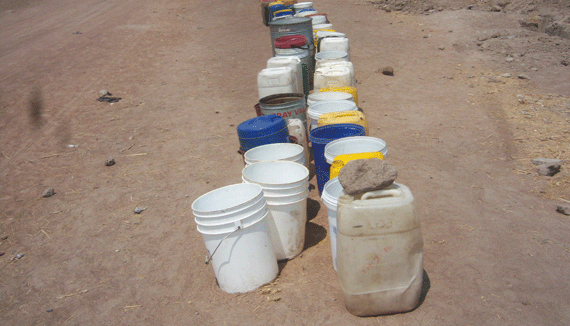
ZIMBABWE’S economic stagnation has affected almost every family, but for Shorai Moyo (40) and her four children, life has never been the same since coal producer Hwange Colliery Company began to struggle to pay salaries.
Moyo’s husband is just but one of hundreds of workers at the listed concern whose salaries remain in limbo as the country struggles out of a decade of socioeconomic trouble.
Like most women, Moyo says being a mother loads her with household pain.
The weight that was on her husband suddenly shifted from him to her.
“Sometimes I sacrifice not to eat for the sake of my children and husband. The sight of my children’s hungry faces brings tears in my eyes and I end up sacrificing myself,” she added.
Moyo is one among scores of women who was engaged in running battles with the police in a still-born dawn demonstration to force the company to pay their husbands their dues.
The women suffered humiliation and brutality at the hands of the State with some getting injured while others were sent to prison as an innocent inquiry exercise into their rights turned into a political hot potato.
“We are hungry. Our children have been expelled from school for non-payment of fees as our husbands have gone for more than five months without getting full salaries. A few of their colleagues ended up in hospital as police violently disrupted the small demostration.
- Chamisa under fire over US$120K donation
- Mavhunga puts DeMbare into Chibuku quarterfinals
- Pension funds bet on Cabora Bassa oilfields
- Councils defy govt fire tender directive
Keep Reading
“We did not want to expose our spouses,” another woman said requesting anonymity.
“Though we supplement our husband’s non-existent and meagre salaries with vending, the money we earn from selling vegetables is not adequate to sustain the lives of our families,” another woman added.
According to Talent Ndlovu a women activist, women are the ones mostly affected by economic hardships.
“Women have been at the receiving end of economic hardships in Zimbabwe as they spend most of their time fending for their families with companies failing to pay salaries. Life becomes unbearable for women and children in most cases,” Ndlovu said.
“We have suffered for too long and life has become a nightmare for us.
“There is no food and our children are starving,” chipped in another as the conversation turned animated.
Veronica Mutengwa (37) wife to a Colliery worker, says the company’s failure to pay salaries has caused most families untold pain despite the token grocery packages Hwange has offered.
“Though the company gave us 10kg of sugar, mealie-meal, and bars of soap, it is still not enough to cater for the necessities of the family,” Mutengwa said.
George Sibanda, a resident in Harare criticised the Zimbabwe authorities for trivialising issues affecting women.
“Women bear almost all responsibility for meeting basic needs of the family, yet they are denied the resources and freedom of action they need to fulfil this responsibility,” Sibanda said.
“The violent nature of how Zimbabwe’s authorities react to any form of protest infringes on ordinary Zimbabweans’ right to have their concerns heard,” Sibanda said.
“How can police assault people who are exercising their democratic right?” Sibanda queried.
Former Women’s affairs deputy minister Jessie Majome condemned the police behaviour and pronounced it as one among other reasons that made it harder for women to obtain justice.
“Police must never do that. Violence against women feeds off discrimination and serves to reinforce it,” Majome said. “The police were brutal and their behaviour was totally unprofessional.
“That kind of behaviour is intolerable in a democratic country whose Constitution values women’s rights. Police must serve to protect women’s rights instead of unleashing violence upon them,” Majome added.
While the executives at the colliery continue to earn their fat perks and go home to sleep on a full stomach, the struggle for the Hwange women continues while some will forever bear the scars for the struggle to have a meal.
Mateline Tsama is a third year student at the National University of Science and Technology doing journalism and media studies










